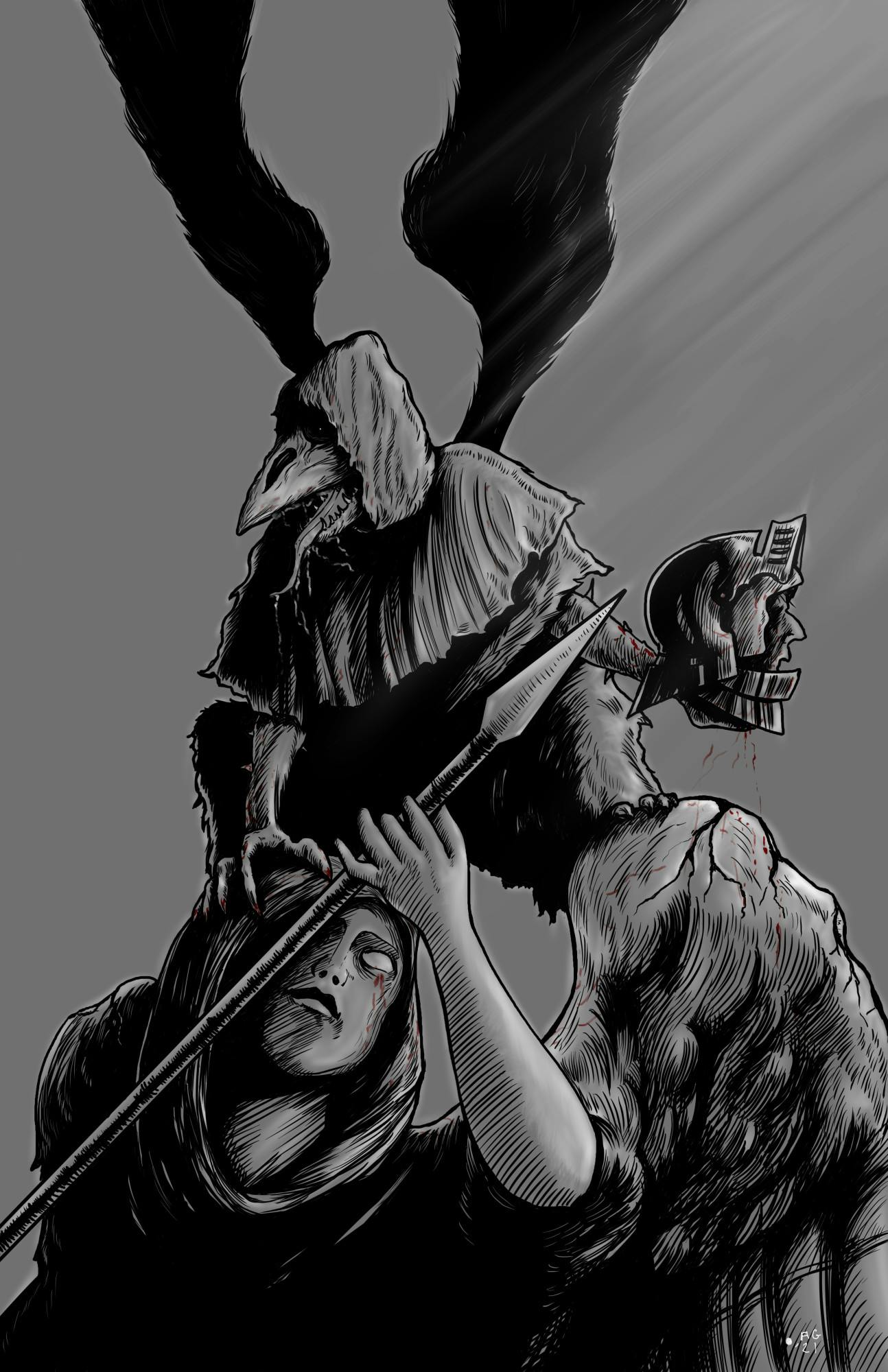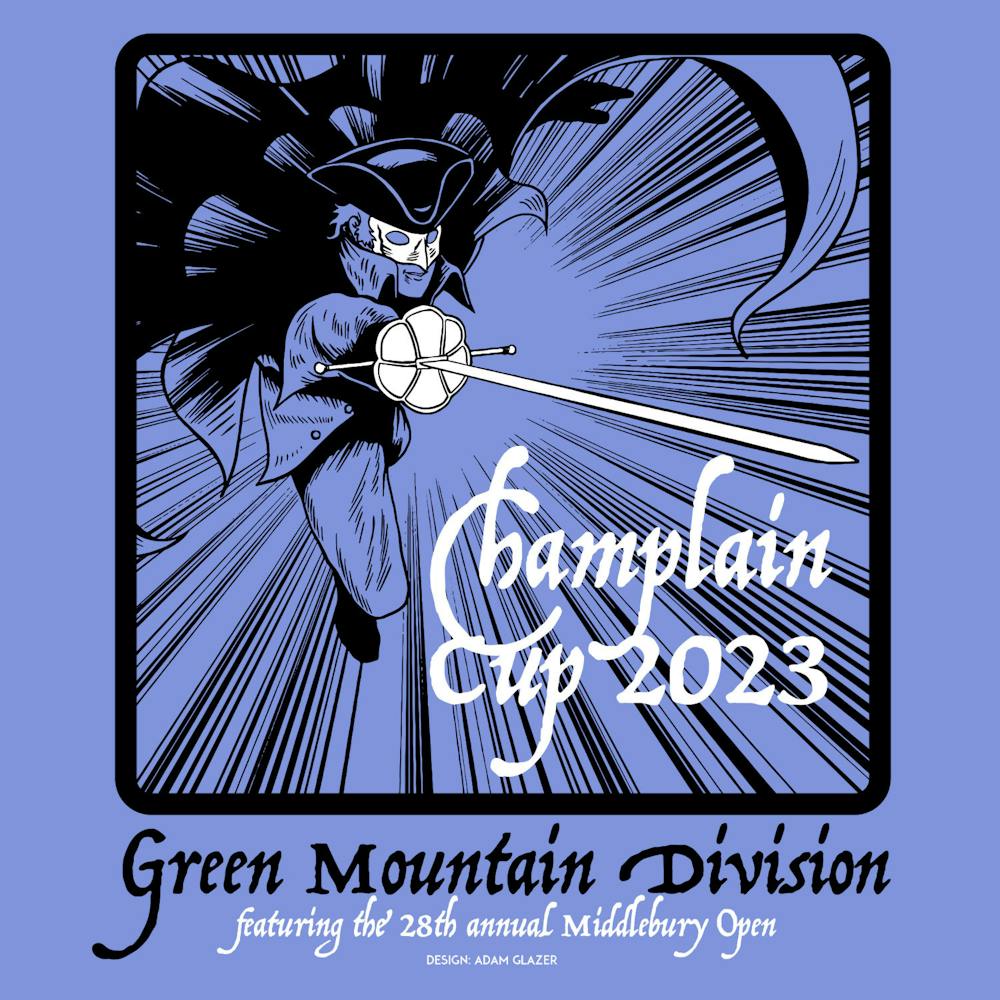Frequent visitors to Little Seed Coffee Roasters may recognize its most artistic regular, often perched on one of the coffee shop’s trademark millennial pink chairs, notebook and pencil in hand.
His name is Adam Glazer, and he works as a freelance illustrator based in Middlebury. After earning his BFA from the Cleveland Institute of Art in 1998, Glazer worked as a storyboard artist for independent films in Cleveland before moving to Vermont in 2003. He lived in Burlington for roughly a decade, where he became involved in the gallery scene, and eventually took up residence in Middlebury.
He spent a stint as an in-house production designer at Addison County printer the Little Pressroom for several years prior to becoming a full-time freelance artist.
Glazer has had his own online studio since the late 90s named “Studio Inner Sanctum,” inspired by the television show, “Dark Shadows.” On the studio’s website, Glazer shares information about recent projects, a gallery of past work and links to his online store.
Perhaps Glazer’s most exciting upcoming plan is to develop an original graphic novel.
“It’s mostly dark medieval fantasy, kind of like ‘Game of Thrones,’ but with the plague doctor,” Glazer told The Campus. Fascinated by medieval and renaissance imagery, Glazer is still in the process of worldbuilding and remains focused on drafting the plot and storyboarding.
Ultimately, he intends to self-publish the novel using an online platform. “I would love to have it done within three years,” he added.
With a big project such as this graphic novel, Glazer generally prefers to begin drafting outlines and concepts with physical materials before completing the final illustrations on his iPad.
He referenced structuring a work routine as one of the most difficult and most important parts of being a self-employed artist. “Time management can be the bane of ourselves,” Glazer said, smiling ruefully.
“You have to be mindful about your working process,” he added. “So what I do is I go for a walk, I go there to the coffee shop, take out my sketchbook and draw by hand to work out a problem.”
Treating Little Seed as a dedicated work environment is one strategy Glazer uses to boost productivity because it takes him away from temptations and distractions at home.
Another key aspect of working as a freelancer is chasing clients. Glazer jokingly compared the work of a freelancer to that of a bounty hunter. “[You] have to hustle to get the job or contract,” Glazer explained. “It’s also about marketing yourself.” In addition to face-to-face conversations and word of mouth, Glazer relies on social media and Zoom to create relationships with clientele.
Glazer is severely hearing impaired, and some of his regular clients include fellow members of the local deaf and hard of hearing community. For instance, Glazer did design work on the logo for Vancro, a nationwide group of ASL interpreters with a satellite office in Vermont.
Glazer also frequently creates works for his fellow fencers, a hobby he has enjoyed since beginning taking fencing lessons fifteen years ago. He is a key member of the Vermont Fencing Alliance, under the Green Mountain Division, for which he has designed several logos and t-shirts. Nowadays, he also works as an assistant coach for beginning fencers.
Real-life swordplay also appears on the page as an influence on Glazer’s personal illustrations. “Fencing allows me to understand how bladework works, so if I’m doing a fencing scene in comics, it’s hard to fake it,” he said.
A sword is featured in Glazer’s recent collaboration with the Middlebury Skatepark Project. Skatepark president Ethan Murphy approached Glazer about creating a piece for auction, whose proceeds would benefit the group. In thinking of a piece for the auction, Glazer was inspired by an exhibition he saw in the past that used snowboards as canvases.
“I’ve always been curious about what it’s like to do illustration work for a skateboard,” he said. “It’s really fascinating because of the composition constraints.”
The final illustration features a crowned skeleton holding a sword surrounded by a banner that reads “non omnia viscera inglorius” — “no guts, no glory” in Latin.
As Glazer works to grow back his business post-pandemic, another crisis looms.

“The biggest problem now is artificial intelligence,” Glazer said. He currently relies on a program called Nightshade to prevent his artwork from being used by AI but is eager to see the government pass legislation that offers more widespread protection and royalties to artists.
“It’s one of those forefronts that all of those visual artists, voice actors, actors, writers, journalists and whatnot have to be widely concerned about,” Glazer said.
In the meantime, Glazer is certainly not resting on his laurels — “I’m always doing research, brainstorming, always thinking 24/7 of other possibilities. It’s nonstop in my head.”

Acadia Klepeis ’24 (she/her) is an Arts & Culture Editor.
She is an English major and a French and Francophone Studies minor. Last year, Cadi studied literature in Paris and in Oxford through Middlebury’s school abroad programs. She spent this past summer working as a communications intern for the Vermont Arts Council. Previously, she completed internships with Tuttle Publishing, Theatre in Paris, and Town Hall Theater. Cadi is also on the board for Middlebury College Musical Theatre.




